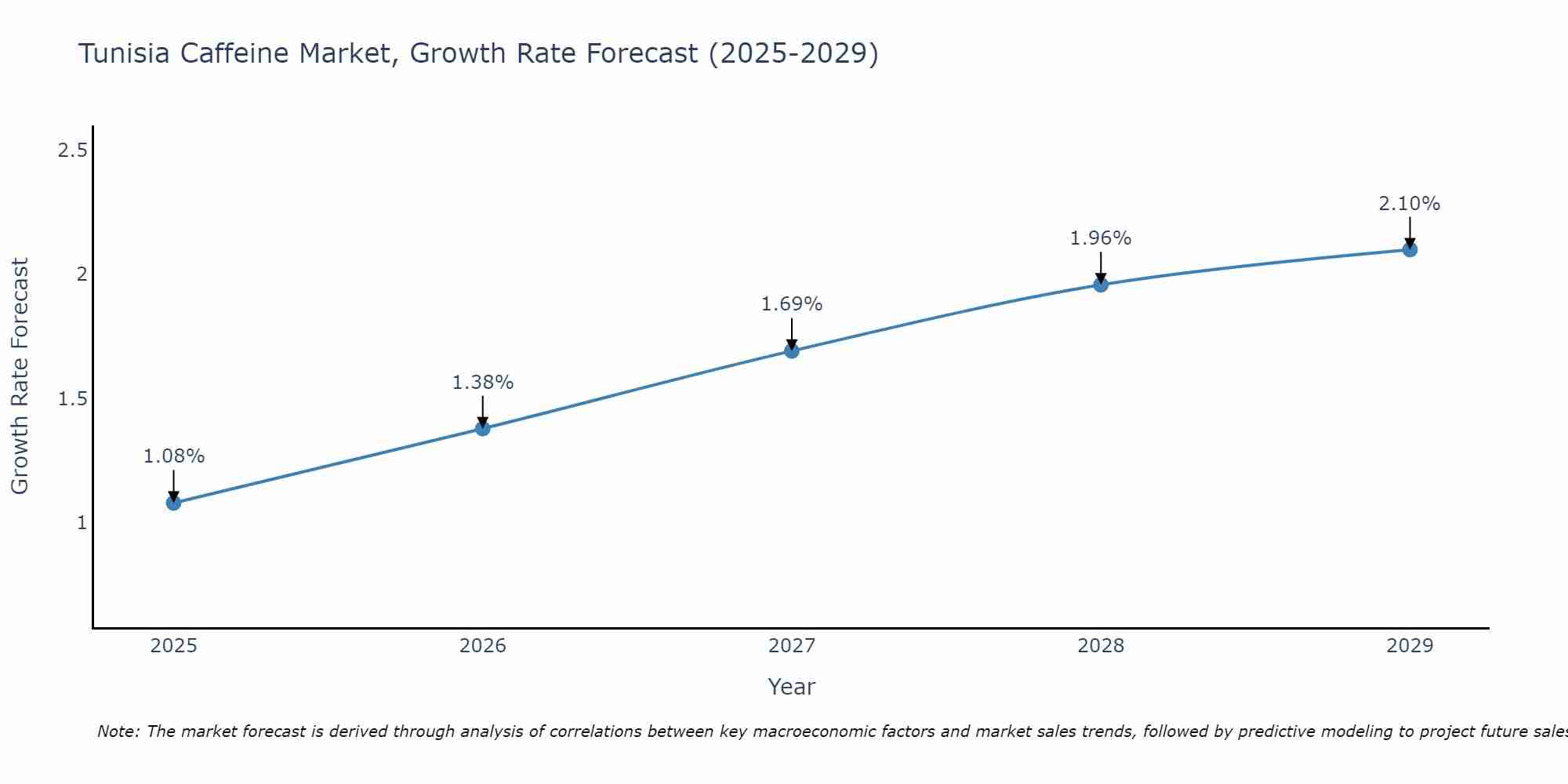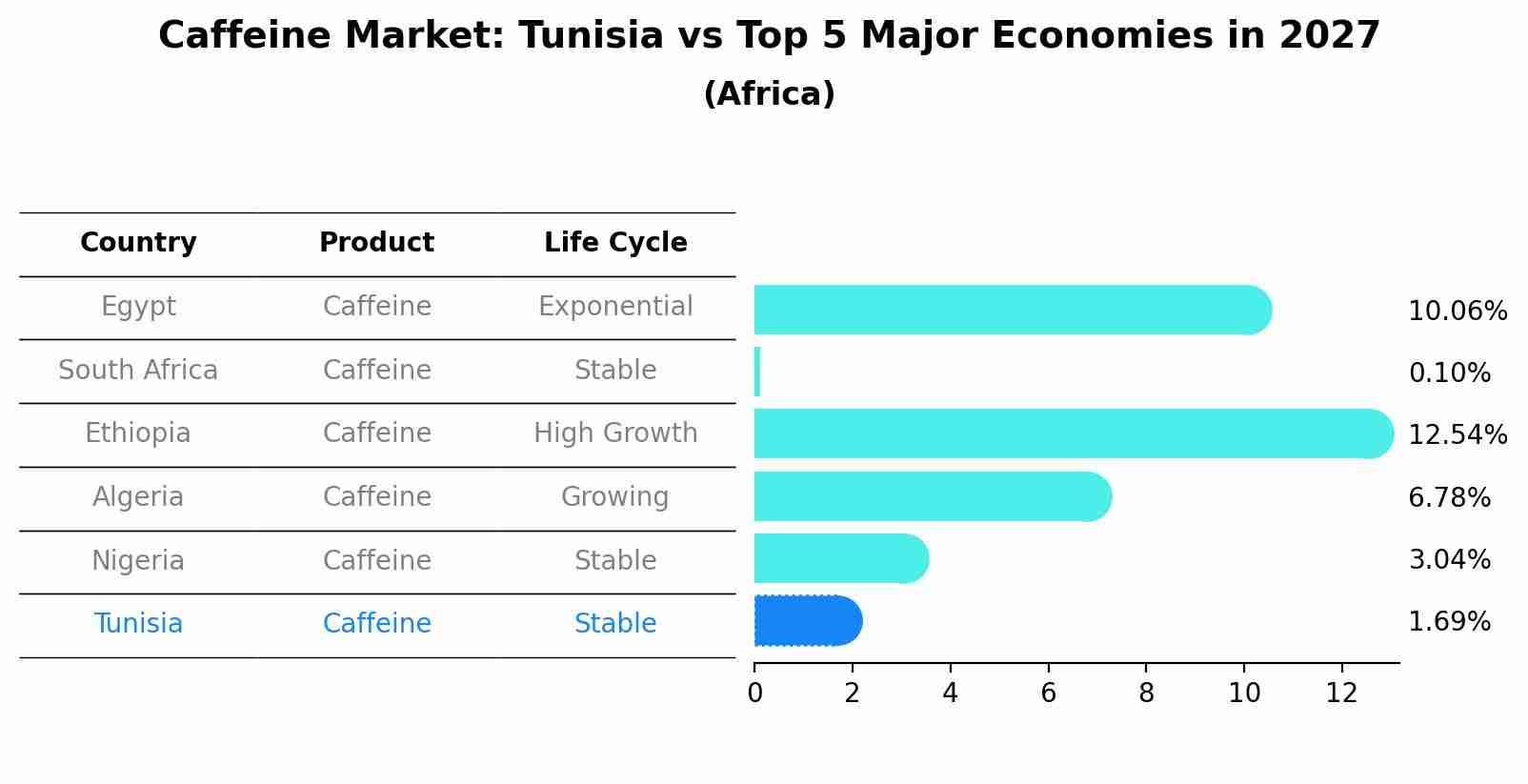Tunisia Caffeine Market (2025-2031) Outlook | Analysis, Industry, Trends, Forecast, Size, Share, Companies, Value, Growth & Revenue
| Product Code: ETC110053 | Publication Date: Jun 2021 | Updated Date: Apr 2025 | Product Type: Report | |
| Publisher: 6Wresearch | Author: Ravi Bhandari | No. of Pages: 70 | No. of Figures: 35 | No. of Tables: 5 |
Tunisia Caffeine Market Size Growth Rate
The Tunisia Caffeine Market is likely to experience consistent growth rate gains over the period 2025 to 2029. From 1.08% in 2025, the growth rate steadily ascends to 2.10% in 2029.

Caffeine Market: Tunisia vs Top 5 Major Economies in 2027 (Africa)
Tunisia's Caffeine market is anticipated to experience a stable growth rate of 1.69% by 2027, reflecting trends observed in the largest economy Egypt, followed by South Africa, Ethiopia, Algeria and Nigeria.

Tunisia Caffeine Market Overview
The caffeine market in Tunisia involves the production and consumption of caffeine, a stimulant found in coffee, tea, energy drinks, and pharmaceutical products, valued for its psychoactive effects and stimulatory properties.
Drivers of the market
The Tunisia caffeine market is driven by the increasing demand for caffeinated beverages, including coffee, tea, and energy drinks. Caffeine is widely consumed for its stimulating effects and is used in various food and pharmaceutical products. Additionally, the growing awareness of the health benefits of caffeine, including improved cognitive function and physical performance, further supports market growth.
Challenges of the market
Health concerns and regulatory restrictions on caffeine content in beverages and supplements influence market dynamics despite consumer demand for energy-boosting products, necessitating product diversification and health-focused marketing strategies.
Government Policy of the market
The Tunisian government is fostering the growth of the caffeine market to support the food and pharmaceutical industries. Policies include financial incentives for manufacturers, grants for research and development of new caffeine products, and initiatives to promote the use of locally produced caffeine in various applications. The government also ensures that caffeine production complies with international quality and safety standards, enhancing its competitiveness in global markets.
Key Highlights of the Report:
- Tunisia Caffeine Market Outlook
- Market Size of Tunisia Caffeine Market, 2024
- Forecast of Tunisia Caffeine Market, 2031
- Historical Data and Forecast of Tunisia Caffeine Revenues & Volume for the Period 2021-2031
- Tunisia Caffeine Market Trend Evolution
- Tunisia Caffeine Market Drivers and Challenges
- Tunisia Caffeine Price Trends
- Tunisia Caffeine Porter's Five Forces
- Tunisia Caffeine Industry Life Cycle
- Historical Data and Forecast of Tunisia Caffeine Market Revenues & Volume By Type for the Period 2021-2031
- Historical Data and Forecast of Tunisia Caffeine Market Revenues & Volume By Natural Caffeine for the Period 2021-2031
- Historical Data and Forecast of Tunisia Caffeine Market Revenues & Volume By Synthetic Caffeine for the Period 2021-2031
- Historical Data and Forecast of Tunisia Caffeine Market Revenues & Volume By Applications for the Period 2021-2031
- Historical Data and Forecast of Tunisia Caffeine Market Revenues & Volume By Pharmaceuticals for the Period 2021-2031
- Historical Data and Forecast of Tunisia Caffeine Market Revenues & Volume By Food for the Period 2021-2031
- Historical Data and Forecast of Tunisia Caffeine Market Revenues & Volume By Beverages for the Period 2021-2031
- Historical Data and Forecast of Tunisia Caffeine Market Revenues & Volume By Flavours and Fragrances for the Period 2021-2031
- Tunisia Caffeine Import Export Trade Statistics
- Market Opportunity Assessment By Type
- Market Opportunity Assessment By Applications
- Tunisia Caffeine Top Companies Market Share
- Tunisia Caffeine Competitive Benchmarking By Technical and Operational Parameters
- Tunisia Caffeine Company Profiles
- Tunisia Caffeine Key Strategic Recommendations
Frequently Asked Questions About the Market Study (FAQs):
Export potential assessment - trade Analytics for 2030
Export potential enables firms to identify high-growth global markets with greater confidence by combining advanced trade intelligence with a structured quantitative methodology. The framework analyzes emerging demand trends and country-level import patterns while integrating macroeconomic and trade datasets such as GDP and population forecasts, bilateral import–export flows, tariff structures, elasticity differentials between developed and developing economies, geographic distance, and import demand projections. Using weighted trade values from 2020–2024 as the base period to project country-to-country export potential for 2030, these inputs are operationalized through calculated drivers such as gravity model parameters, tariff impact factors, and projected GDP per-capita growth. Through an analysis of hidden potentials, demand hotspots, and market conditions that are most favorable to success, this method enables firms to focus on target countries, maximize returns, and global expansion with data, backed by accuracy.
By factoring in the projected importer demand gap that is currently unmet and could be potential opportunity, it identifies the potential for the Exporter (Country) among 190 countries, against the general trade analysis, which identifies the biggest importer or exporter.
To discover high-growth global markets and optimize your business strategy:
Click Here- Single User License$ 1,995
- Department License$ 2,400
- Site License$ 3,120
- Global License$ 3,795
Search
Thought Leadership and Analyst Meet
Our Clients
Related Reports
- India Switchgear Market Outlook (2026 - 2032) | Size, Share, Trends, Growth, Revenue, Forecast, Analysis, Value, Outlook
- Pakistan Contraceptive Implants Market (2025-2031) | Demand, Growth, Size, Share, Industry, Pricing Analysis, Competitive, Strategic Insights, Strategy, Consumer Insights, Analysis, Investment Trends, Opportunities, Revenue, Segments, Value, Segmentation, Supply, Forecast, Restraints, Outlook, Competition, Drivers, Trends, Companies, Challenges
- Sri Lanka Packaging Market (2026-2032) | Outlook, Competition, Drivers, Trends, Demand, Pricing Analysis, Competitive, Strategic Insights, Companies, Challenges, Strategy, Consumer Insights, Analysis, Investment Trends, Opportunities, Growth, Size, Share, Industry, Revenue, Segments, Value, Segmentation, Supply, Forecast, Restraints
- India Kids Watches Market (2026-2032) | Strategy, Consumer Insights, Analysis, Investment Trends, Opportunities, Growth, Size, Share, Industry, Revenue, Segments, Value, Segmentation, Supply, Forecast, Restraints, Outlook, Competition, Drivers, Trends, Demand, Pricing Analysis, Competitive, Strategic Insights, Companies, Challenges
- Saudi Arabia Core Assurance Service Market (2025-2031) | Strategy, Consumer Insights, Analysis, Investment Trends, Opportunities, Growth, Size, Share, Industry, Revenue, Segments, Value, Segmentation, Supply, Forecast, Restraints, Outlook, Competition, Drivers, Trends, Demand, Pricing Analysis, Competitive, Strategic Insights, Companies, Challenges
- Romania Uninterruptible Power Supply (UPS) Market (2026-2032) | Industry, Analysis, Revenue, Size, Forecast, Outlook, Value, Trends, Share, Growth & Companies
- Saudi Arabia Car Window Tinting Film, Paint Protection Film (PPF), and Ceramic Coating Market (2025-2031) | Strategy, Consumer Insights, Analysis, Investment Trends, Opportunities, Growth, Size, Share, Industry, Revenue, Segments, Value, Segmentation, Supply, Forecast, Restraints, Outlook, Competition, Drivers, Trends, Demand, Pricing Analysis, Competitive, Strategic Insights, Companies, Challenges
- South Africa Stationery Market (2025-2031) | Share, Size, Industry, Value, Growth, Revenue, Analysis, Trends, Segmentation & Outlook
- Afghanistan Rocking Chairs And Adirondack Chairs Market (2026-2032) | Size & Revenue, Competitive Landscape, Share, Segmentation, Industry, Value, Outlook, Analysis, Trends, Growth, Forecast, Companies
- Afghanistan Apparel Market (2026-2032) | Growth, Outlook, Industry, Segmentation, Forecast, Size, Companies, Trends, Value, Share, Analysis & Revenue
Industry Events and Analyst Meet
Whitepaper
- Middle East & Africa Commercial Security Market Click here to view more.
- Middle East & Africa Fire Safety Systems & Equipment Market Click here to view more.
- GCC Drone Market Click here to view more.
- Middle East Lighting Fixture Market Click here to view more.
- GCC Physical & Perimeter Security Market Click here to view more.
6WResearch In News
- Doha a strategic location for EV manufacturing hub: IPA Qatar
- Demand for luxury TVs surging in the GCC, says Samsung
- Empowering Growth: The Thriving Journey of Bangladesh’s Cable Industry
- Demand for luxury TVs surging in the GCC, says Samsung
- Video call with a traditional healer? Once unthinkable, it’s now common in South Africa
- Intelligent Buildings To Smooth GCC’s Path To Net Zero


















